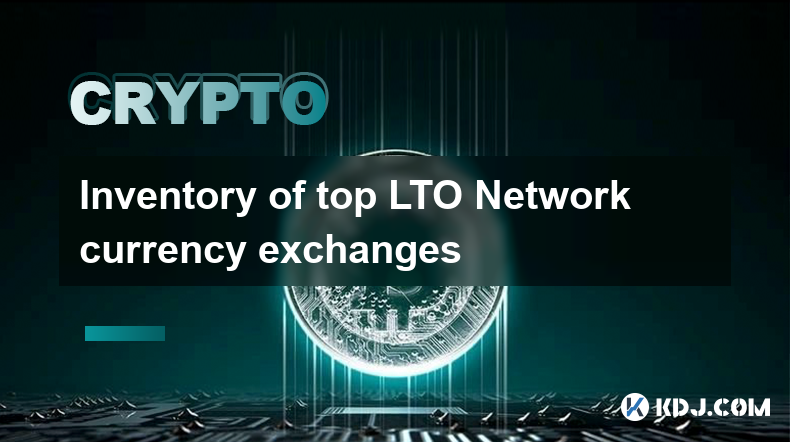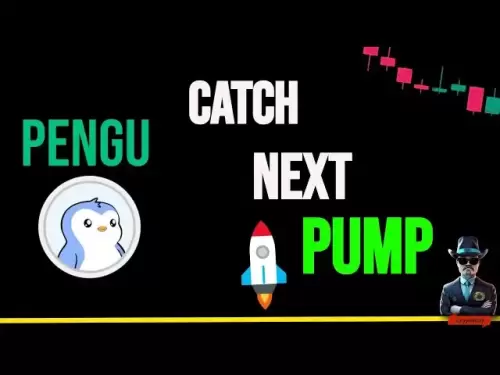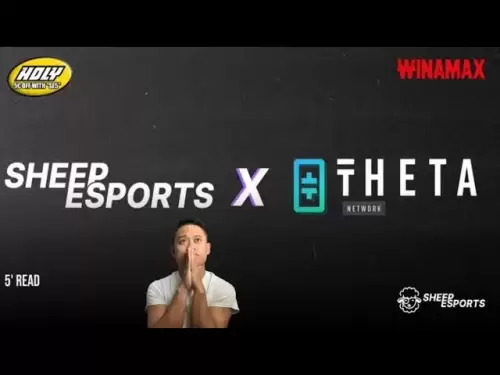-
 Bitcoin
Bitcoin $106,782.3966
-0.72% -
 Ethereum
Ethereum $2,406.7764
-1.16% -
 Tether USDt
Tether USDt $1.0005
0.02% -
 XRP
XRP $2.0918
-1.53% -
 BNB
BNB $644.5785
-0.17% -
 Solana
Solana $141.0925
-0.69% -
 USDC
USDC $1.0000
0.02% -
 TRON
TRON $0.2721
0.18% -
 Dogecoin
Dogecoin $0.1585
-1.26% -
 Cardano
Cardano $0.5497
-1.14% -
 Hyperliquid
Hyperliquid $35.8493
-1.58% -
 Bitcoin Cash
Bitcoin Cash $502.3089
2.20% -
 Sui
Sui $2.7092
3.87% -
 Chainlink
Chainlink $12.8551
-1.85% -
 UNUS SED LEO
UNUS SED LEO $9.0548
0.53% -
 Stellar
Stellar $0.2344
-0.85% -
 Avalanche
Avalanche $17.2676
-0.23% -
 Toncoin
Toncoin $2.8282
0.56% -
 Shiba Inu
Shiba Inu $0.0...01113
-1.14% -
 Litecoin
Litecoin $83.9593
-0.93% -
 Hedera
Hedera $0.1447
0.82% -
 Monero
Monero $306.9022
-2.07% -
 Bitget Token
Bitget Token $4.6358
3.42% -
 Dai
Dai $0.9999
0.01% -
 Ethena USDe
Ethena USDe $1.0001
0.02% -
 Polkadot
Polkadot $3.3211
0.06% -
 Uniswap
Uniswap $6.8775
0.75% -
 Pi
Pi $0.5664
-0.27% -
 Aave
Aave $256.0055
1.28% -
 Pepe
Pepe $0.0...09013
-3.24%
Inventory of top LTO Network currency exchanges
When evaluating LTO Network currency exchanges, consider KYC requirements, trading fees, and security measures, with exchanges like Binance, Coinbase Pro, and KuCoin standing out for their robust features.
Dec 25, 2024 at 11:46 pm

Key Points:
- Criteria for evaluating LTO Network currency exchanges
- KYC requirements, fees, and security measures of major exchanges
- Comprehensive list and details of the top LTO Network currency exchanges
Introduction:
Decentralized exchanges offer the unique capability to trade cryptocurrencies without the requirement for an intermediary. However, due to security and regulatory concerns, many cryptocurrency enthusiasts tend to favor centralized exchanges to facilitate their trading activities.
This article delves into the intricacies of choosing trustworthy and functional centralized exchanges for LTO Network (LTO) currency trading. We meticulously examine KYC requirements, trading fees, and security measures to help you navigate the LTO Network trading landscape with confidence.
Top LTO Network Currency Exchanges:
1. Binance
- KYC: Required for most users
- Fees: 0.1% maker fee and 0.1% taker fee
- Security: Two-factor authentication (2FA), anti-phishing code, and dedicated security team
2. Huobi Global
- KYC: Required for all users
- Fees: 0.2% maker fee and 0.2% taker fee
- Security: Multi-factor authentication (MFA), cold storage, and regular security audits
3. Coinbase Pro
- KYC: Required for all users
- Fees: Variable maker-taker fees based on trading volume
- Security: Two-factor authentication (2FA), biometric login, and robust encryption
4. KuCoin
- KYC: Required for certain features and high withdrawal limits
- Fees: 0.1% maker fee and 0.1% taker fee
- Security: Two-factor authentication (2FA), Know-Your-Customer (KYC) verification, and segregated storage
5. Bittrex
- KYC: Required for all users
- Fees: 0.25% maker fee and 0.25% taker fee
- Security: Two-factor authentication (2FA), multi-stage withdrawal process, and SOC 2 Type 1 compliance
6. Gate.io
- KYC: Required for certain features and high withdrawal limits
- Fees: 0.2% maker fee and 0.2% taker fee
- Security: Two-factor authentication (2FA), multi-signature cold storage, and regular penetration testing
7. OKX
- KYC: Required for all users
- Fees: Variable maker-taker fees based on trading volume
- Security: Two-factor authentication (2FA), SSL encryption, and dedicated security team
8. MEXC Global
- KYC: Required for most users
- Fees: 0.2% maker fee and 0.2% taker fee
- Security: Two-factor authentication (2FA), anti-phishing code, and regular security audits
9. Bybit
- KYC: Not required for certain features and low withdrawal limits
- Fees: 0.1% maker fee and 0.1% taker fee
- Security: Two-factor authentication (2FA), cold storage, and bug bounty program
10. Crypto.com
- KYC: Required for all users
- Fees: Variable maker-taker fees based on trading volume and stake level
- Security: Two-factor authentication (2FA), multi-factor authentication (MFA), and cold storage
FAQs:
Q: Which exchange is the most secure for LTO Network trading?
A: All the exchanges listed in this article employ robust security measures, but some are considered more secure due to their additional features, such as Coinbase Pro and Huobi Global.
Q: What are the KYC requirements for LTO Network exchanges?
A: Most LTO Network exchanges require KYC verification for all users, while some, like Bybit, do not require KYC for certain features and low withdrawal limits.
Q: Which exchange offers the lowest trading fees for LTO Network?
A: Binance and Huobi Global offer the lowest trading fees for LTO Network, with a maker fee and taker fee of 0.1% and 0.2%, respectively.
Q: How do I choose the best LTO Network exchange for me?
A: Consider your specific needs, such as security, fees, trading volume, and customer support, to select the LTO Network exchange that suits you best.
Disclaimer:info@kdj.com
The information provided is not trading advice. kdj.com does not assume any responsibility for any investments made based on the information provided in this article. Cryptocurrencies are highly volatile and it is highly recommended that you invest with caution after thorough research!
If you believe that the content used on this website infringes your copyright, please contact us immediately (info@kdj.com) and we will delete it promptly.
- Altcoin Exchange Flows Dip: Is an Incoming Rally Brewing?
- 2025-06-28 08:30:12
- Clanker Crypto: Everything You Need to Know About This 2025 Token Creation Tool
- 2025-06-28 08:30:12
- Bitcoin Price Check: Fresh Demand Needed to Break the Range
- 2025-06-28 08:50:12
- SoftBank's AI Gambit: Betting Big on Artificial Super Intelligence
- 2025-06-28 08:50:12
- Clementine Valentine's Coin Fountain Floor: A New York State of Mind
- 2025-06-28 09:30:12
- XRP, Cardano, and MAGACOIN FINANCE: Charting the Crypto Course in 2025
- 2025-06-28 09:50:12
Related knowledge

How to customize USDT TRC20 mining fees? Flexible adjustment tutorial
Jun 13,2025 at 01:42am
Understanding USDT TRC20 Mining FeesMining fees on the TRON (TRC20) network are essential for processing transactions. Unlike Bitcoin or Ethereum, where miners directly validate transactions, TRON uses a delegated proof-of-stake (DPoS) mechanism. However, users still need to pay bandwidth and energy fees, which are collectively referred to as 'mining fe...

USDT TRC20 transaction is stuck? Solution summary
Jun 14,2025 at 11:15pm
Understanding USDT TRC20 TransactionsWhen users mention that a USDT TRC20 transaction is stuck, they typically refer to a situation where the transfer of Tether (USDT) on the TRON blockchain has not been confirmed for an extended period. This issue may arise due to various reasons such as network congestion, insufficient transaction fees, or wallet-rela...

How to cancel USDT TRC20 unconfirmed transactions? Operation guide
Jun 13,2025 at 11:01pm
Understanding USDT TRC20 Unconfirmed TransactionsWhen dealing with USDT TRC20 transactions, it’s crucial to understand what an unconfirmed transaction means. An unconfirmed transaction is one that has been broadcasted to the blockchain network but hasn’t yet been included in a block. This typically occurs due to low transaction fees or network congestio...

How to check USDT TRC20 balance? Introduction to multiple query methods
Jun 21,2025 at 02:42am
Understanding USDT TRC20 and Its ImportanceUSDT (Tether) is one of the most widely used stablecoins in the cryptocurrency market. It exists on multiple blockchain networks, including TRC20, which operates on the Tron (TRX) network. Checking your USDT TRC20 balance accurately is crucial for users who hold or transact with this asset. Whether you're sendi...

What to do if USDT TRC20 transfers are congested? Speed up trading skills
Jun 13,2025 at 09:56am
Understanding USDT TRC20 Transfer CongestionWhen transferring USDT TRC20, users may occasionally experience delays or congestion. This typically occurs due to network overload on the TRON blockchain, which hosts the TRC20 version of Tether. Unlike the ERC20 variant (which runs on Ethereum), TRC20 transactions are generally faster and cheaper, but during...

The relationship between USDT TRC20 and TRON chain: technical background analysis
Jun 12,2025 at 01:28pm
What is USDT TRC20?USDT TRC20 refers to the Tether (USDT) token issued on the TRON blockchain using the TRC-20 standard. Unlike the more commonly known ERC-20 version of USDT (which runs on Ethereum), the TRC-20 variant leverages the TRON network's infrastructure for faster and cheaper transactions. The emergence of this version came as part of Tether’s...

How to customize USDT TRC20 mining fees? Flexible adjustment tutorial
Jun 13,2025 at 01:42am
Understanding USDT TRC20 Mining FeesMining fees on the TRON (TRC20) network are essential for processing transactions. Unlike Bitcoin or Ethereum, where miners directly validate transactions, TRON uses a delegated proof-of-stake (DPoS) mechanism. However, users still need to pay bandwidth and energy fees, which are collectively referred to as 'mining fe...

USDT TRC20 transaction is stuck? Solution summary
Jun 14,2025 at 11:15pm
Understanding USDT TRC20 TransactionsWhen users mention that a USDT TRC20 transaction is stuck, they typically refer to a situation where the transfer of Tether (USDT) on the TRON blockchain has not been confirmed for an extended period. This issue may arise due to various reasons such as network congestion, insufficient transaction fees, or wallet-rela...

How to cancel USDT TRC20 unconfirmed transactions? Operation guide
Jun 13,2025 at 11:01pm
Understanding USDT TRC20 Unconfirmed TransactionsWhen dealing with USDT TRC20 transactions, it’s crucial to understand what an unconfirmed transaction means. An unconfirmed transaction is one that has been broadcasted to the blockchain network but hasn’t yet been included in a block. This typically occurs due to low transaction fees or network congestio...

How to check USDT TRC20 balance? Introduction to multiple query methods
Jun 21,2025 at 02:42am
Understanding USDT TRC20 and Its ImportanceUSDT (Tether) is one of the most widely used stablecoins in the cryptocurrency market. It exists on multiple blockchain networks, including TRC20, which operates on the Tron (TRX) network. Checking your USDT TRC20 balance accurately is crucial for users who hold or transact with this asset. Whether you're sendi...

What to do if USDT TRC20 transfers are congested? Speed up trading skills
Jun 13,2025 at 09:56am
Understanding USDT TRC20 Transfer CongestionWhen transferring USDT TRC20, users may occasionally experience delays or congestion. This typically occurs due to network overload on the TRON blockchain, which hosts the TRC20 version of Tether. Unlike the ERC20 variant (which runs on Ethereum), TRC20 transactions are generally faster and cheaper, but during...

The relationship between USDT TRC20 and TRON chain: technical background analysis
Jun 12,2025 at 01:28pm
What is USDT TRC20?USDT TRC20 refers to the Tether (USDT) token issued on the TRON blockchain using the TRC-20 standard. Unlike the more commonly known ERC-20 version of USDT (which runs on Ethereum), the TRC-20 variant leverages the TRON network's infrastructure for faster and cheaper transactions. The emergence of this version came as part of Tether’s...
See all articles























































































